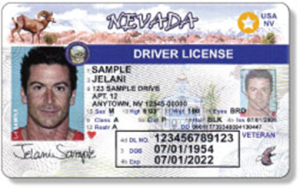 I.D. checking is one of the most important jobs of a hospitality professional. Checking I.D. keeps patrons safe, and it keeps things legal. Here at the TAM of Nevada office, we often get questions from students about which documents can be used as valid forms of identification for the purpose of selling alcohol. In a town like Las Vegas, full of tourists from around the world, with varying forms of I.D., do you know what you can accept?
I.D. checking is one of the most important jobs of a hospitality professional. Checking I.D. keeps patrons safe, and it keeps things legal. Here at the TAM of Nevada office, we often get questions from students about which documents can be used as valid forms of identification for the purpose of selling alcohol. In a town like Las Vegas, full of tourists from around the world, with varying forms of I.D., do you know what you can accept?
Valid identification must be government-issued, contain the person’s photo, contain their birth date, and not be expired. Depending on the type of I.D. being presented, and which state or country it is issued from, it may also contain other information such as signature, mailing address, or gender. Nevada driver licenses, for example, also contain a signature.
Accepted forms of I.D. include:
- Driver License or State Identification Card – These are the most commons forms of I.D. that hospitality professionals will be presented with.
- Military ID – You may also see these, particularly around military bases.
- Passport or Immigration Card – A passport is another common form of identification, particularly in a tourist town such as Las Vegas. Likewise, a Green Card (permanent resident card) is also acceptable I.D.
Forms of I.D. that are NOT acceptable for making alcohol sales include:
- Concealed Firearm Permit – While a concealed weapon permit is a form of state-issued identification, it is not an acceptable identification for serving or selling alcohol. According to Nevada law at NRS 202.3653 – 202.369, Concealed Firearm Permits are valid for a period of 5 years and can be renewed for additional 5 year periods. A permit holder must carry the permit together with proper identification whenever they are in actual possession of the concealed firearm(s). For I.D. checking purposes, the permit is only good when you are also carrying another acceptable form of identification, so the point is moot for alcohol sales. A gun permit holder must also have another form of identification on their person. If you are presented with a concealed firearm permit to check I.D., simply ask to see their driver license or other form of identification.
- Driver’s Authorization Card (DAC) – In Nevada, a Driver’s Authorization Card looks like a lot like driver’s license, but is not valid for serving alcohol, entering facilities where I.D. is required, or boarding an airplane.
- Student ID, TAM® Card, and other non-government issued Photo I.D. – While a valid TAM® Card includes a photo of the card holder, that’s not enough to confirm identification. The same holds for student I.D.s and similar forms of membership identification.
When in doubt or if you have questions about I.D. checking, speak with your supervisor and review company policy for acceptable forms of identification. Your establishment may have an identification guide like the I.D. Checking Guide for you to use – this will show you what to look for on various forms of I.D. to confirm authenticity. Additionally, your TAM® alcohol awareness class will teach you how to spot valid and bogus identification. For more information, visit our blog post on I.D. checking.
Questions or feedback? Head to the Comments section below and let us know about your I.D. checking experiences!



